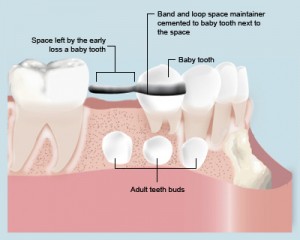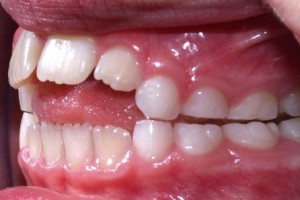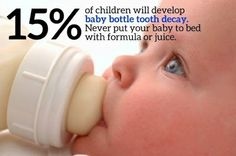Kid’s Teeth
As the Top Rated Local® Missoula dentist, Bitterroot Dental is an exceptional choice when it comes to children’s dentistry. Dr. David B. Duke is a gentle dentist, and with his focus on laser dentistry, he provides the most comfortable and pain-free experience possible.
Pediatric Dentistry At Its Finest
From repairing cavities in baby teeth to handling problems caused by thumb sucking, to custom mouth-guards for children who play contact sports and even newborn tongue and lip ties, Bitterroot Dental is the premier choice for kids’ dentistry. With Dr. Duke’s modern approach, your child can experience a joyful trip to the family dentist in Missoula without feeling afraid.
Continue reading below for an extensive overview of pediatric dentistry services offered at Bitterroot Dental, or schedule an appointment today!
Cavities in Baby Teeth
One of the most common questions parents ask us is “Do I need to fix the cavity on my child’s baby tooth?” The answer is, it depends on several factors.
Different baby teeth (primary teeth) are replaced by the permanent teeth at different ages. So depending on the age of your child and which tooth has a cavity, you may not need to fix the cavity. An x-ray will also give us a good idea how long until the baby tooth is replaced. If the baby tooth affected will not be replaced for more than one year or the decay is extensive, the cavity should be addressed.
When a cavity in a child is not fixed, there can be severe long term consequences:
- Cavities are caused by harmful bacteria. When a cavity is left untreated, these harmful bacteria spread to adjacent teeth and begin breaking them down. Often the new permanent molars will get cavities soon after eruption if the child’s mouth has too many cavity causing bacteria.
- If a baby tooth abscesses or the pulp becomes injured because of deep cavities, the developing adult tooth below the roots of the baby teeth will not develop properly. Infections around developing teeth can cause the outer enamel to form incorrectly.
- If a small cavity is not fixed, it will certainly get larger. Baby teeth guide the eruption of permanent teeth and if a baby tooth is removed prematurely, it may cause problems with the space of the teeth. This developes bite concerns that will most likely require orthodontics (braces) to fix. Though, a space maintainer can be used to hold the teeth in the correct place if a tooth must be removed prematurely.
- A child’s smile is important for self esteem, confidence and peer acceptance.
- Baby teeth help with proper chewing so the child can maintain good nutrition
- Teeth are involved in the formation of speaking sounds. When teeth are missing or lost, it will affect the development of the child’s speech.
After performing an examination Dr. Duke will discuss any relevant concerns with the parents, including whether an affected primary tooth will be lost soon or need repair.

Sealants
 Sealants are a great way to protect against tooth decay and cavities on your back teeth (molars). These are the teeth that are most vulnerable to cavities and decay because they are used in the chewing process, and are the most difficult to reach and clean. Molars first come in at around 5-7 years of age, with a second set coming in between the ages of 11-14. It is best to have a sealant placed when the molars first come in to ensure they are protected early.
Sealants are a great way to protect against tooth decay and cavities on your back teeth (molars). These are the teeth that are most vulnerable to cavities and decay because they are used in the chewing process, and are the most difficult to reach and clean. Molars first come in at around 5-7 years of age, with a second set coming in between the ages of 11-14. It is best to have a sealant placed when the molars first come in to ensure they are protected early.
To place a sealant an adhesive is first applied to the teeth. The sealant is then placed over the adhesive as a liquid, as if it is painted right onto the tooth. The liquid then hardens and creates a barrier between your tooth and any plaque, food particles, and bacteria. Sealants last for about 10 years and can be reapplied if necessary.
Pulpotomy
 When decay on a baby tooth reaches the pulp, the center of a baby tooth, or gets very close a pulpotomy is needed. Bacteria from the cavity will invade the live pulp area of the tooth, causing pain. If left alone, eventually the tooth will abscess and become very painful. A pulpotomoy removes the tooth affected by the cavity and eliminates bacteria from the inside of the tooth, while allowing the live tissues in the roots to remain. In this way, the roots are still alive and will reform normally when the child reaches the appropriate age for the tooth to come loose.
When decay on a baby tooth reaches the pulp, the center of a baby tooth, or gets very close a pulpotomy is needed. Bacteria from the cavity will invade the live pulp area of the tooth, causing pain. If left alone, eventually the tooth will abscess and become very painful. A pulpotomoy removes the tooth affected by the cavity and eliminates bacteria from the inside of the tooth, while allowing the live tissues in the roots to remain. In this way, the roots are still alive and will reform normally when the child reaches the appropriate age for the tooth to come loose.
Although a pulpotomy is commonly called a baby root canal, it is very different from an adult root canal. A pulpotomy involves removing only the “top” live tissues inside the tooth, while leaving the live parts inside the roots. In an adult, all live tissues are removed and the roots are sealed. Pulpotomies are performed quicker than an adult root canal and children tolerate them very well. Pulpotomies are significantly cheaper than adult root canals as well.
Generally, a tooth will need a stainless steel crown after a pulpotomy. Frequently these two procedures are done the same day. A pulpotomy is our last chance to save a tooth before removing the tooth is required.
 Unlike small cavities that can usually be restored with fillings, larger cavities affect greater tooth structure and often need to be restored with a crown. Most often a stainless steel crown is used, though sometimes different crowns are used if a front tooth is affected. The stainless steel crown covers the entire tooth and give added protection and strength to the tooth. Crowns do not affect the child’s natural process of losing the tooth. Stainless steel crowns are much less expensive than an adult crown and are much quicker to complete. In fact, it requires only one visit in most situations.
Unlike small cavities that can usually be restored with fillings, larger cavities affect greater tooth structure and often need to be restored with a crown. Most often a stainless steel crown is used, though sometimes different crowns are used if a front tooth is affected. The stainless steel crown covers the entire tooth and give added protection and strength to the tooth. Crowns do not affect the child’s natural process of losing the tooth. Stainless steel crowns are much less expensive than an adult crown and are much quicker to complete. In fact, it requires only one visit in most situations.
In many cases, a stainless steel crown may be the only way to save a significantly damaged tooth. If a tooth is lost too early, there will be many problems that arise later.
Space Maintainer
When a child loses a tooth too early, it can have a negative effect on the permanent teeth. One important purpose for baby teeth is to hold open the space for the adult tooth to erupt in its correct location when it is ready. If a baby tooth is lost and the space is no maintained, the adult tooth will not have room to erupt correctly. This means it will either erupt in the wrong place, not erupt fully or possibly not erupt at all and a malocclusion or bad bite will develop. If any of these occur, orthodontics (braces) will be needed to correct the problem.
Sometimes, it is not possible to save a baby tooth. But, space maintainers are metal loops that attache to the adjacent tooth and span the area the lost tooth was located, abutting the far tooth. This prevents the teeth from tilting or drifting into the space, thereby holding open the appropriate space for the adult teeth to erupt when it is ready. The space maintainer is easily removed when it begins to interfere in the eruption of the adult tooth.
Thumb Sucking
 Thumb sucking is a natural, soothing habit for a baby or young child. However, if a child sucks their thumb excessively or too late in life, it can have major effects on the child’s tooth position, jaw growth, sleep habits, behavior, and social standing. Most frequently, children who have a thumb sucking tendency have an anterior open bite, an open gap in the front teeth, top front teeth that are tilted outward, stunted growth of the bottom jaw and lower front teeth that are tilted backwards, and a high vaulted and narrow top jaw. The teeth may be more sensitive as well. These tooth and growth changes will need orthodontic and possibly surgical correction. When left uncorrected, these children are more frequently found to show ADD-like tendencies and poor performance in school due to sleep apnea as well as asthma.
Thumb sucking is a natural, soothing habit for a baby or young child. However, if a child sucks their thumb excessively or too late in life, it can have major effects on the child’s tooth position, jaw growth, sleep habits, behavior, and social standing. Most frequently, children who have a thumb sucking tendency have an anterior open bite, an open gap in the front teeth, top front teeth that are tilted outward, stunted growth of the bottom jaw and lower front teeth that are tilted backwards, and a high vaulted and narrow top jaw. The teeth may be more sensitive as well. These tooth and growth changes will need orthodontic and possibly surgical correction. When left uncorrected, these children are more frequently found to show ADD-like tendencies and poor performance in school due to sleep apnea as well as asthma.
Most children will stop sucking their thumb on their own between ages two to four. The earlier a child stops sucking a thumb, the better for the teeth and growth of the jaws. In some cases, changes can be noticed as early as two years old. After age four, it may be necessary for the parents to seek the advice of your Missoula dentist.
Baby Bottle Decay
 Baby bottle decay is caused by the frequent and long-term exposure of a child’s teeth to liquids containing sugars. Milk, formula, fruit juice, sodas and other sweetened drinks can cause baby bottle tooth decay. The sugars from these drinks pool at the base of the infant’s tooth and gums, feeding the bacteria that cause plaque. Every time a child consumes a sugary beverage, acid attacks the teeth and gums. After repeated attacks, tooth decay begins. Most often, the top front teeth are affected.
Baby bottle decay is caused by the frequent and long-term exposure of a child’s teeth to liquids containing sugars. Milk, formula, fruit juice, sodas and other sweetened drinks can cause baby bottle tooth decay. The sugars from these drinks pool at the base of the infant’s tooth and gums, feeding the bacteria that cause plaque. Every time a child consumes a sugary beverage, acid attacks the teeth and gums. After repeated attacks, tooth decay begins. Most often, the top front teeth are affected.
This condition is frequently associated with a child falling asleep with a bottle or cup containing a sugary beverage. It can also be associated with breast-fed infants who have prolonged feeding habits or with children whose pacifiers are frequently dipped in syrup, honey or sugary liquids.
To avoid baby bottle decay, never allow your infant or child to fall asleep with a sugary beverage. Clean the gums and teeth with a toothbrush or wet washcloth daily. Have your child see a dentist by age one or when the first tooth erupts.
Mouth Guards
Mouth guards are an essential piece of equipment in contact sports. They should be worn by athletes of all ages who participate in sports such as:
- Football
- Hockey
- Lacrosse
- Wrestling
- Basketball
- Baseball/Softball
- Soccer
- Any other sport where contact is a possibility
Wearing a mouth guard helps prevent against structural damage to your teeth and jaw and also helps prevent injuries such as lacerations to your cheeks, tongue, and lips. Mouth guards have also been shown to help decrease the risk of concussions.
Mouth guards are available in most any sporting goods store, but you should be careful when purchasing a mouth guard. Mouth guards like this do not offer the best level of protection. They are also usually ill-fitting, uncomfortable and limit breathing.
For the highest level of comfort and protection, you should visit your dentist for a custom mouth guard fitting. A custom mouth guard is created specifically for the optimal protection of your mouth. It is created with thin plastic that is hardened to protect your teeth. The thinness of the custom mouth guard allows for easy breathing and also allows for easy communication, which is especially important for you star quarterbacks calling out the signals.
See your Missoula dentist today for a custom mouth guard to protect your teeth and ensure that you maintain the highest level of performance on the field, court, or rink.


